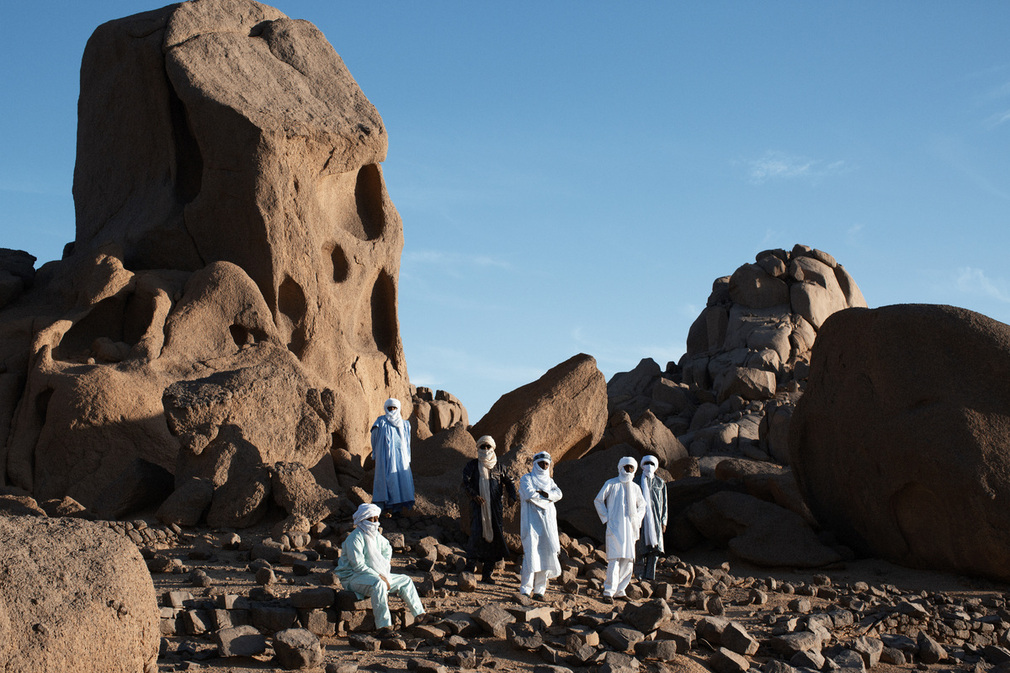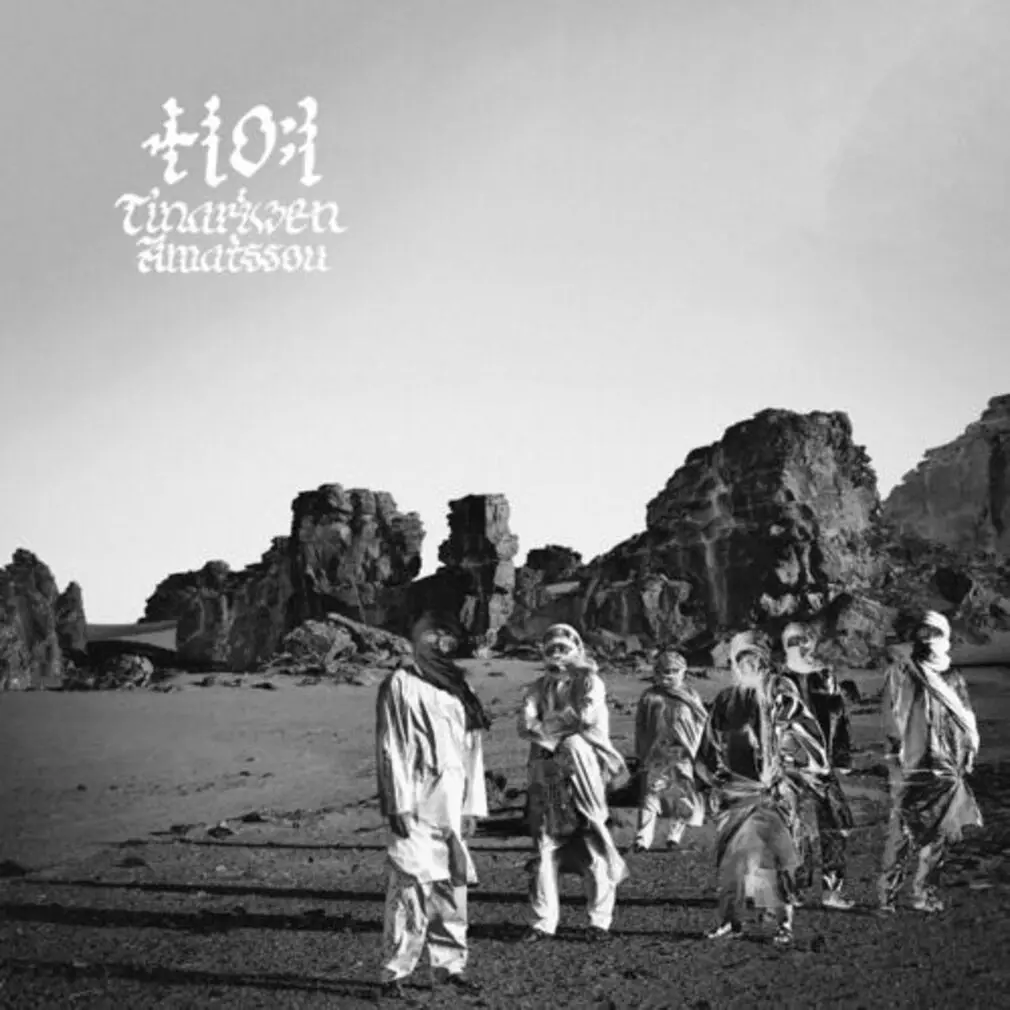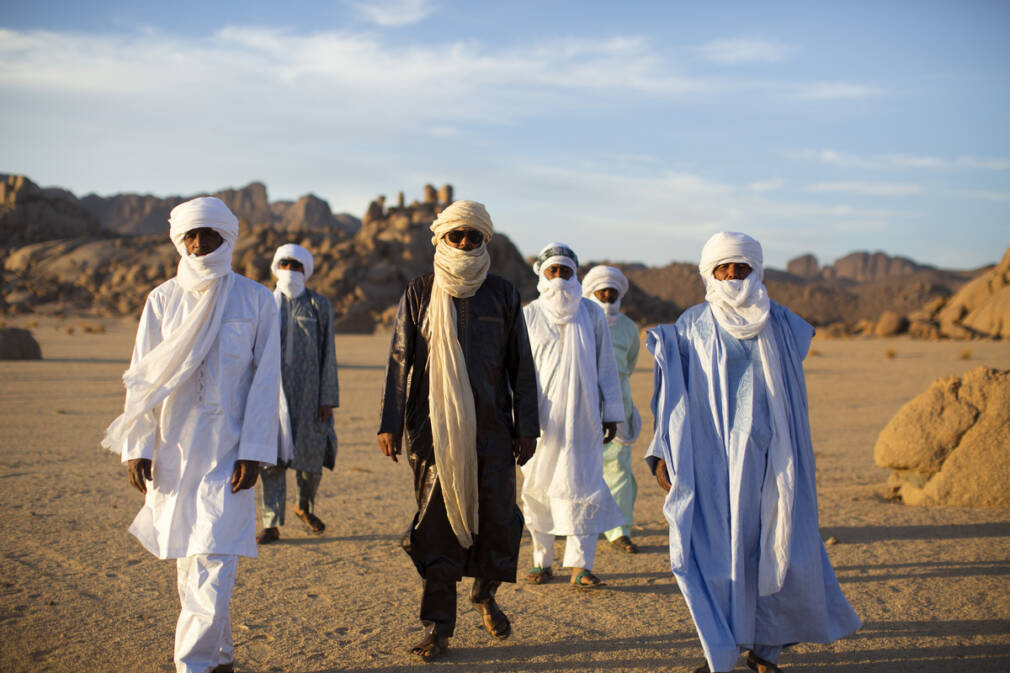We met with Abdallah ag Alhousseini at the foot of the Assekrem, one of the high plateaus reigning over the Hoggar region, a three-hour drive from Tammarasset. He talked about Tinariwen‘s future, present and past. Forty years earlier, the guitarist and composer, born in 1968 in the north of Mali, moved to the major city of the Algerian Sahara, where he encountered Ibrahim ag Alhabib and Alhassan ag Touhami, who had just founded Intayaden, the seminal group of the Ishumar movement of young unemployed Tuareg people who had left the desert to live in cities, and who were looking for other ways to resist without resorting to armed struggle. Abdallah soon joined the group, and then became one of the main spokesmen, devoting his energies to spreading the musical message of the Tinariwen Tuaregs across the globe. They imposed a sound, desert blues, which became their signature. Twenty years after their emergence and global fame as the ambassadors of the Tamasheq (Tuareg) culture, Tinariwen has just released a new album, which creates ties with another aspect of the United States: country music. The occasion for Abdallah to explain this intimate connection and also to evoke the group’s past and future.
What role does Tamanrasset play in the life of the group as well as for the Tuareg communities?
The city has played a key role in the group’s history, musicians like Eyadou were born there, and others like me arrived in 1983 to start a family. That’s where the Humar style was born and formalized, and where I saw Ibrahim and Hassan for the first time, and also where I started playing. And, in more general terms, given its geographic situation and the geo-political evolution of the Sahara, Tamanrasset is in a way the Turareg capital. This was the rallying point for the Tuaregs who were scattered across thousands of kilometers, whether they were from Algeria, the Hoggar, Mali, Niger…
That’s also where the great singer Badi Lalla lives, in Tahaggart, an area where many Tuaregs live who fled the great drought at the beginning of the 1970’s… What does tradition mean for Tinariwen?
It’s the source we often drew inspiration from. We even invited her to join us on stage in Paris, at the Bouffes du Nord in 2014. Our music is the vision of young people in relation to this tradition. A way of re-creating it. I’m very interested in traditional poetry, even if the Tamasheq cause is very present in the songs that I propose.
Tinariwen has inspired numerous groups that have followed in its footsteps. How do you see the group’s evolution over the past forty years?
It hasn’t evolved that much. And those that continue are a little like us. It has to be said that it is difficult to live from your music here : no music schools, no concert halls, no music stores. It’s not easy for a style to evolve with so many constraints. We lack many things. The result is that there haven’t been major changes in the structure of the music.
It’s mainly during your tours in Europe and in the United States that you got ideas for new directions, like on this new album where you invited country musicians…
The structure, the spirit is the same, even if we added instruments, even if the sound has evolved. Of all music, country is the one closest to our spirit. It really touches me, and yet there is no historical relation to our music. It’s a music that speaks to the soul like ours does, and as is often the case, it’s not easy to explain why…
Tinariwen has often been compared to the blues, the music of the African-American people, as opposed to country music, that of White people…
If you listen to Tinariwen, it sounds closer to blues, which doesn’t prevent me from being more moved by country music. And this was long before we went to the United States. Without sometimes even knowing their names, I listened to a lot of cassettes. Tracy Chapman, Johnny Cash, Eric Clapton – even if he’s more rock.
Going to the United States allowed you to delve more into this music…
In the United States we tried to do concerts with local musicians and to meet them, like in Nashville. It’s never easy to meet them, because we’re just passing through cities : we arrive on the day of the concert and leave during the night or the next morning. We would need more time, like for the song Emmaar, where we stayed a long time in Los Angeles and were able to meet with Americans at Joshua Tree. (A famous recording studio in California, editor’s note).
I heard that your new album was supposed to be recorded here in Tamanrasset with musicians from the United States…
Yes, except that with Covid and travel restrictions, the Americans weren’t able to come. For the past several years we haven’t been able to do anything here. The recording engineers can’t come to the north of Mali nor to Niger. So we were obliged to record our last albums in Morocco, or for the latest one in Djanet. This choice gives us more security, and therefore more freedom. It was the only place we could record in the mountains for several weeks with four Westerners with us, with no obligation to be accompanied by policemen.
You used material from another Tuareg group, Imarhan, originally from Tamanrasset…
Yes, we’ve had the chance to work for twenty-five years with the same sound engineer, Jaja, but he can no longer come whenever he wants when we’re in the desert. He could teach his knowledge to young sound engineers from here. To have trained sound engineers in the desert would be a plus in order to capture our music in its true dimension. And it changes everything to be able to work with someone from home. He can adjust our sound, which is natural for him. It makes things more flexible. An Ishumar can see for himself which sound goes with each song. Having worked so long with us, Jaja knows all this, but he is the only one. If tomorrow for whatever reason he stops working, it would be impossible to find someone to replace him. Jaja has spent a lot of time in the desert, he has experienced our hardships, our suffering, he has recorded in every possible situation.This experience, learned over time, is irreplaceable.
Why did you name this album Amatssou (fear)?
There is increasing fear in our region, the desert, especially in the north of Mali. It’s even worse than ten years ago. The presence of Wagner, the new leaders in Mali, the terrorist groups, the conditions the population live in, everything is getting out of control.
You’re not very optimistic about the future…
For that, the population would have to react on a massive scale. The Tuaregs are very fragile because of the world we live in. It is not easy to live in the desert in such a situation, with a never-ending war which has consequences every day. We are a minority, we can’t resist these types of problems for long. It’s a threat to our culture, which could disappear.

Has this broken the unity of the community?
In general, problems provoke a dispersion, especially because there is also a political dimension and business ambitions. The current crisis has also allowed some of us to be more united, those who think only of their dignity, of the integrity of their territory…
This is the role of Tinariwen, which represents something stronger than just music…
We have already done it, but we can’t do anything more. Our music remains a memory, which also brings back memories, a moral support that preserves our culture’s spirit. We have aged, we can no longer do more. Our songs created a unity for the community of those who aspire to dignity, and for many people listening to them reminds them of the grandeur of the Tuareg cause. Younger generations will use them and improve them, give them new life for other people. Whether they’re from Mali, Niger, or Algeria, all the young Tuaregs who play music do it with the same spirit : they talk about suffering, exile, even if they haven’t experienced what we went through.
You still continue in spite of everything on this new album… You still believe in it?
Of course we can. But I repeat : we can’t do any more! 90% of our problems, still unresolved, are linked to education. Most of the young people of the 90s generation never went to school, and in fact they evoke everything that was already stigmatized : suffering, marginalization… Even if they were born in Tamanrasset. As long as we haven’t resolved this issue, we’ll be going round in circles. What’s more, the problems have been compounded and multiplied by the situation in Mali. I have the impression that it’s even easier to terrorize people today than it was twenty years ago.
Even if music plays a role of raising awareness, you put the emphasis on education as the main solution…
Music plays a big role, in all the communities. This gives us hope, orientates things. But other people have to take over, like we did when we started out. At the time, the vast majority listened to Ishumar music, now there are a lot more options. But music cannot solve everything.
In your case, music changed you…
Music opened doors for me, helped me to discover the world, to have a better understanding of the planet. But I prefer that my children have the chance to go to school, so that they will be fully capable of confronting the world. I can’t force it, it doesn’t do any good, if it’s going to happen, it will happen. Like it did for me. It has to be inside you, it has to come from your heart, your guts.
Retrospectively, thanks to you, the Tuareg world is more well known all over the planet, and the hardships of its reality, well beyond the clichés.
In the West, people don’t know much about our world. As soon as we left Mediterranean countries, most people had a very romantic vision. Who in the United States knew about our world ? I soon realized this every time I was interviewed. We have always been aware of our role as mediators, of disseminators of our history, of our community, the expectations of our people. In concert and also in interviews, we have spent a lot of energy on this. In a sense it was one of our missions, with a true political dimension. It was very deliberate, to the point of getting tired of it.
As you said: you’ve gone as far as you can go.
Now, at my age, I can’t do more. I have children, a family, they need me, and when I’m on tour I worry even more than before. All this has an effect on my state of mind. And my health is no longer what it was, and I’m well aware that this can’t last forever.
Foreign tours are often exhausting, and yet the adventure continues…
We’ve stuck together since 2000. We have shared many moments, on stage and in our lives. Now, I’d like to try other things, like other people. What saved us, or rather preserved us, in all this, is that Tuaregs aren’t accustomed to talk much about questions of planning, agendas… We do not spend our evenings talking about all the organizational aspects. This has allowed us to remain united, otherwise we would all have gone our own different ways.
Do you see a life after Tinariwen?
After, there is another world. Other generations will arrive, will do other things, some of whom will never have heard of us, and I’m not sure that it will be missed by everyone. It’s the wheel of time. When we emerged, we were the only ones, and the older generations remain very attached to our music, with a little nostalgia. Today, there is a multiplication of propositions, and so much the better. With the arrival of technologies, the internet in particular, everything changed, information circulates faster, and reaches us. Young musicians are very quickly connected to the rest of the world, and this functions both ways : they promote their music in the same way they are stimulated by numerous other influences.
Having spoken with people in Tamanrasset, and seeing your audiences in France, your music still speaks to the younger generations…
Young people are obviously making remixes, manipulating our music. For us, it’s good as long as the message is clear and spreads, because this corresponds to our initial objective. It’s normal that they do rap or techno, the sound of their generation. The way they do it doesn’t matter, what counts is that our lyrics carry the message.
And yet you reach audiences that know nothing about the Tamasheq language, but understand what you’re talking about…
When your music is based on a well-thought-out message, many people will understand it through your way of singing, your way of playing guitar. The audience is in expectation of these types of proposals. Authenticity does not lie. That was the original message of Tinariwen, a music made to inspire, to heighten awareness, to listen to.

Amatssou available here.




